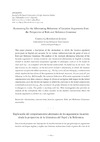Identificador persistente para citar o vincular este elemento:
https://accedacris.ulpgc.es/jspui/handle/10553/35344
| Título: | Accounting for the alternating behaviour of location arguments from the perspective of Role and Reference Grammar | Otros títulos: | Explicación del comportamiento alternante de los argumentos locativos desde la perspectiva de la Gramática del Papel y la Referencia | Autores/as: | Rodríguez-Juárez, Carolina | Clasificación UNESCO: | 57 Lingüística 5704 Teoría lingüística |
Palabras clave: | Alternations Constructions Location argument Role and Reference Grammar Macroroles, et al. |
Fecha de publicación: | 2017 | Publicación seriada: | Atlantis | Resumen: | This paper presents a description of the alternations in which the location argument participates in English and accounts for its various realizations from the point of view of Role and Reference Grammar. The analysis of the multiple alternating behaviour of the location argument in various transitive and intransitive alternations in English is mostly related to marked macrorole assignment typically to undergoer, such as in He loaded the truck with hay-as compared with the kernel construction He loaded hay on the truck-but also to actor as, for instance, in the location subject alternation, in which the location argument occupies the subject position, e.g., The bag carries all your belongings, a construction which implies the loss of one of the arguments in the kernel structure, You can carry all your belongings in the bag. Additionally, the syntactic behaviour of location arguments in marked constructions very often conveys a change of Aktionsart ascription with respect to the kernel construction, as in the swarm alternation in which the predicate in the kernel construction is analysed as an activity, e.g., Bees swarmed in the garden, whereas in the marked construction it changes to a state, The garden is swarming with bees. This investigation also provides an analysis of the with-phrase that is often encoded in the marked constructions where the location argument is codified as a core argument. Este artículo presenta una descripción de las alternancias en las que participa un argumento locativo en lengua inglesa y explica sus distintas realizaciones desde el punto de vista de la Gramática del Papel y la Referencia. El análisis del comportamiento alternante múltiple del argumento locativo en las distintas alternancias transitivas e intransitivas está principalmente vinculado a una asignación marcada del macropapel, típicamente a padecedor, tal y como se da en He loaded the truck with hay—en comparación con la construcción matriz He loaded hay on the truck—pero también a actor, como por ejemplo en la alternancia en la que el argumento locativo ocupa la posición del sujeto, por ejemplo en The bag carries all your belongings, una construcción que implica la pérdida de uno de los argumentos en la estructura matriz, You can carry all your belongings in the bag. Además, el comportamiento sintáctico de los argumentos locativos en las construcciones marcadas puede a menudo conllevar un cambio de ascripción de Aktionsart con respecto a la construcción matriz, tal y como ocurre en la denominada alternancia swarm, en la que el predicado en la construcción matriz es analizado como una actividad, como en Bees swarmed in the garden, mientras que en la construcción marcada cambia a estado, The garden is swarming with bees. Así mismo, esta investigación ofrece un análisis de la frase introducida por with que se encuentra a menudo codificada en las construcciones marcadas en las que el argumento locativo aparece codificado como un argumento central. |
URI: | https://accedacris.ulpgc.es/handle/10553/35344 | ISSN: | 0210-6124 | DOI: | 10.28914/Atlantis-2017-39.2.09 | Fuente: | Atlantis. Journal of the Spanish Association for Anglo-American Studies [ISSN 0210-6124], v. 39 (2), p. 169-189 | URL: | http://api.elsevier.com/content/abstract/scopus_id/85038639067 |
| Colección: | Artículos |
Citas SCOPUSTM
2
actualizado el 08-jun-2025
Citas de WEB OF SCIENCETM
Citations
2
actualizado el 22-feb-2026
Visitas
81
actualizado el 11-ene-2026
Descargas
110
actualizado el 11-ene-2026
Google ScholarTM
Verifica
Altmetric
Comparte
Exporta metadatos
Los elementos en ULPGC accedaCRIS están protegidos por derechos de autor con todos los derechos reservados, a menos que se indique lo contrario.
